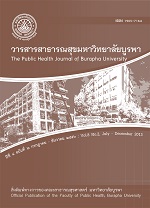Association among Selected Factors, Knowledge of Child Development and Child-abuse Risk in Families with Young Children
Main Article Content
บทคัดย่อ
Family is the important environment influencing a child health and development. The purpose of this correlational research was to examine the relationship between selected factors and knowledge about child development and child-abuse risk in families with young children. The sample consisted of 408 parents with children between 1-6 years of age living in industrial, agricultural, fishery, and tourist areas in Chonburi Province. The sample was obtained with the cooperation of the local administrative organization in each sub-district with the consent of each family.
The measurement instruments used in this study were six questionnaires consisting of the followings: PSI; family communication; child-abuse risk; CES-D; family relations; and knowledge about child development. Descriptive statistics, including percentage, mean, standard deviation, and Pearson correlation, were performed for data analysis.
The results showed that knowledge about child development had a significantly positive relationship with parent's education, family income, family relationship, and family communication (r =.32, .22, .15, and .36 respectively, p<.05), but had significantly negative relationship with parents age, parenting stress, and parent depression (r = -.17, -.23, and -.27 respectively, p<.01). Child abuse risk had a significantly positive relationship with parenting stress and parent depression (r = .41 and .67 respectively, p<.05), but had a significantly negative relationship with parent's education, family income, family relationship, family communication, and knowledge about child development (r = -.16, -.12, -.42, -.40 and -.27 respectively, p<.05). Increasing knowledge about child development might reduce child-abuse risk in families. Therefore, promoting child development, it is essential for nurses to understand the context of the family, particularly in the areas of parent's education, parent stress and depression, family communication, knowledge about child development, and child-abuse risk.

